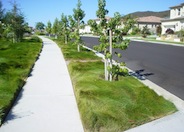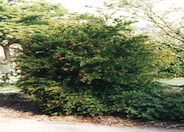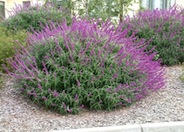
Common name:Lamb's Ears
Botanical name:Stachys byzantina
This tiny, herbaceous shrub will grow less than 1' tall and has medium sized, grayish green leaves with blue and lavender flowers that bloom in the spring.

Common name:Creeping Red Fescue, Red Fescuegras
Botanical name:Festuca rubra
Creeping Red Fescue is not red but dark green. It is a great ground cover kept at longer lengths for banks. It is very shade tolerant and lush looking.

Common name:Dwarf Pomegranate
Botanical name:Punica granatum 'Nana'
This shrub is highly ornamental with dense foliage. It can reach 3' tall and 6' wide. It is easily pruned and shaped, thus its popularity as a bonsai plant. Flowers are small, showy, and red orange, developing into dry red fruit (not edible). It is considered evergreen in mild frost-free winter areas. This shrub is great in containers. It needs extra summer water in hot inland valleys.

Common name:Mexican Bush Sage, Velvet Sage
Botanical name:Salvia leucantha
The Mexican Sage is a bushy shrub that grows 3'-4' tall and wide. It has hairy white stems, gray green leaves and velvet-like purple flower spikes that bloom summer through fall. This shrub tolerates sun, light shade, little water, and is hardy to 15 degrees F. The Mexican Sage is drought tolerant and attracts hummingbirds. -Cornflower Farms

Common name:Kangeroo Paws Big Red
Botanical name:Anigozanthos 'Big Red'
Anigozanthos flavidus 'Tall Red' is a perennial with dark green, smooth, swordlike evergreen leaves. It produces spikes of striking, fuzzy, tubular flowers in yellow-green, tinged with red that are curved at the tips. The flowers attract hummingbirds. Flowers bloom from late spring to fall if spent flowering spikes are cut to the ground. It makes for a good cut flower.
| Designer: | Iron Bench and Lambs Ears |
Photographer: GardenSoft |
Soils and Compost:
Practice grass-cycling by leaving short grass clippings on lawns after mowing, so that nutrients and organic matter are returned to the soil.
Water Saving Tip:
Mulching and adding compost to soil can minimize evaporation and help soil absorb and store water.
Integrated Pest Management:
Drip and other smart irrigation delivers water directly to roots, allowing no excess water for weeds.

